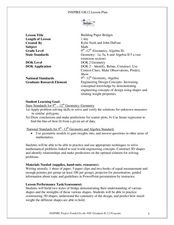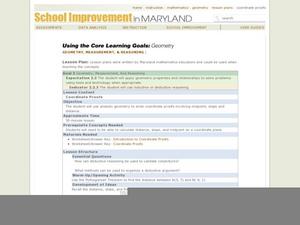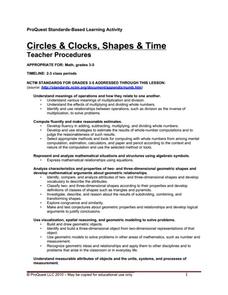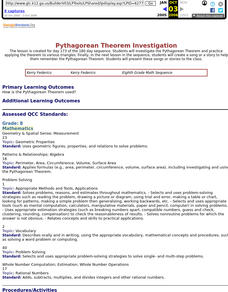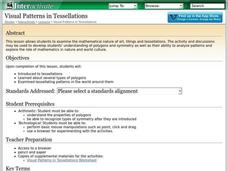Curated OER
Does Order Really Matter?
Investigate the order of operations! Learners participate in interactive multi-media activities to examine and solve multi-step equations, inequalities. They evaluate formulas and simplify monomials and polynomials.
Curated OER
Building Paper Bridges
High schoolers construct a bridge that can hold 100 pennies. In this math lesson, students evaluate the strength of their bridges. They predict how much weight a bridge can hold based on its design.
Alabama Learning Exchange
Writing Word Equations
Students explore the concept of chemical formulas. In this chemical formula lesson, students watch a video about balancing chemical equations. Students conduct an experiment using silver nitrate and sodium phosphate. Students use...
Alabama Learning Exchange
Factoring by Mack
Learners explore the concept of factoring trinomials. For this factoring trinomials lesson, learners use the Mack Method to factor trinomials. Learners watch a video on how to factor a trinomial with a coefficient of 1 with the x...
Pennsylvania Department of Education
Alike and Different
Students compare and contrast objects and are introduced to a Venn Diagram. In this alike and different lesson, students make observations regarding properties of objects. Students classify object and build ideas about variables....
Curated OER
Additive Inverses
Students investigate properties of additive inverses. In this properties of additive inverses instructional activity, students discuss the what it means for two numbers to be opposites. Students discuss representing opposite numbers...
Alabama Learning Exchange
Explore the Transformations of Linear and Absolute Value Functions Using Graphing Utilities
Students explore the concept of transformations. For this transformation lesson, students use an applet that is an interactive absolute value graph applet. Students manipulate the applet to examine the change in the function and how it...
Curated OER
Coordinate Proofs
Students explore the concept of coordinate proofs. In this coordinate proofs lesson, students write coordinate proofs using properties of distance, slope, and midpoint. Students discuss why it is sometimes beneficial to double the...
Curated OER
It's a Party! Solving Multi-step Equations
Students explore the concept of multi-step equations. In the multi-step equation lesson, students solve equations by the 'party method'. Students make a flip book that shows the steps in solving multi-step equations.
Curated OER
Circles and Clocks, Shapes and Time
Students work in groups to research clocks and practice telling time. In this telling time activity, students use the computer program ProQuest to study circles, including radius and diameter, and practice drawing circles using a...
Curated OER
Unit Perimeters and Areas
Young scholars use Geometers SketchPad to find the area and perimeter of several shapes. In this geometry lesson, students determine area of rectangles and progress through irregular polygons. None of the referenced worksheets are...
Texas Instruments
Say What You Mean!
Students analyze data and identify the mean. In this probability lesson, students log data in the TI and construct scatter plots from the data. They identify properties of a scatterplot.
Curated OER
Two-Step Equations
High schoolers explore the concept of solving two-step equations. In this solving two-step equations lesson, students watch a short video about solving equations. High schoolers view a PowerPoint presentation about solving two-step...
Curated OER
Pythagorean Theorem Investigation
Eighth graders investigate the Pythagorean Theorem and practice applying the theorem to various triangles. Finally, in the next lesson in the sequence, 8th graders create a song or a story to help them remember the Pythagorean Theorem.
Curated OER
Houses
Third graders use a number of problem solving strategies in this unit of lessons. They determine how to draw and model three-dimensional objects, use co-ordinate systems, determine probability of events, and identify paths of simple...
Curated OER
Probability Review
Students engage in a lesson that is concerned with the concepts related to probability. They review the key properties of statistics involved in the measurement of probability that includes mean, median, and mode. The lesson includes...
Curated OER
"Ball Bounce" Quadratic Functions
Young scholars manipulate a ball and explore quadratic functions. In this algebra activity, students analyze the graph of a quadratic function. They identify quadratic properties.
Center for Mathematics and Technology
Whole Numbers: Using an Area Model to Explain Multiplication
There are many ways to work through a multiplication problem. Using an area model, kids complete several worksheets with different types of multiplication problems, including multiplying by ten, and explain how the new strategies differ...
Shodor Education Foundation
Pythagorean Theorem
Most adults remember learning about the Pythagorean theorem, but they don't all remember how to use it. The emphasis here is on developing an intuitive understanding of how and when to use the theorem. Young mathematicians explore...
University of Colorado
Modeling Sizes of Planets
The density of the huge planet of Saturn is 0.7 g/cm3, which means it could float in water! In the second part of 22, science pupils explore the size and order of the planets. They then calculate weight and/or gravity and density of...
Shodor Education Foundation
Visual Patterns in Tessellations
Geometers explore the concept of tessellations. They use a tessellation applet to manipulate shapes and design their own tessellation using the applet.
Curated OER
Interpreting Graphs
Sixth graders interpret linear and nonlinear graphs. They create graphs based on a problem set. Next, they represent quantitive relationships on a graph and write a story related to graphing.
Shodor Education Foundation
Sets and the Venn Diagram (Beginner)
Venn diagrams are helpful in understanding the idea of a set and using attributes to sort items. This basic plan is an introduction with an added bonus of an applet that can be used to demonstrate the activity. If a classroom of...
Curated OER
What's the Frequency, Roy G. Biv?
Introduce starting space scientists to the electromagnetic spectrum, expecially the portion of visible light. Teach them about wavelength and frequesncy. Then give them a roll of adding machine tape and a manila folder to make a...



